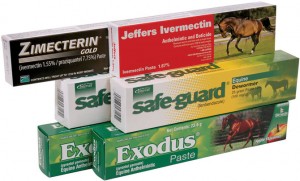What You Should Know About Horse Worms
| Type of Worm | Description |
| Strongyles | Large Strongyles - Also known as bloodworms or roundworms. Eggs that are present in manure hatch into larvae and can be consumed by a grazing horse. The larvae continue to develop in the intestinal tract. Strongyles will travel through blood vessels to various organs until they reach the intestine again. Extensive damage can be caused to the lining of the blood vessels. Horses with this type of parasitic infection may lose weight, become anemic or develop horse colic. In the worst case scenario, the intestinal blood supply may become completely blocked causing sever, sometimes fatal, colic. Blood vessels in extremely infected horses may swell and even rupture, causing sudden death. Small Strongyles - Small strongyle larvae lay dormant in the intestinal wall waiting for the right conditions to materialize. When this happens they may become encysted. If this occurs, small strongyle larvae are not vulnerable to most dewormers. Severe damage may be caused to the intestinal wall if large amounts of small strongyle emerge simultaneously. Diarrhea and colic may be apparent. Weight loss, poor coat condition, slowed growth and loss of condition are other signs of small strongyle infection. |
| Ascarids | Ascarids are also called large roundworms. These parasites are found more often in young horses than older horses. They can grow to 12 inches long and can be found in the hundreds in the small intestine. This can lead to poor nutrition. Common signs of ascarid infestation are coughing, colic and diarrhea. They can cause blockage or even travel through the horse's lungs causing pneumonia. Ascarid eggs are acquired through feces from other horses which can be found in contaminated hay or water. Once the eggs hatch in the intestinal tract, the worms push through the intestinal wall. It usually takes about a week for the worms to reach the lungs. After leaving the lungs, ascarids continue to travel to the horse's mouth to be swallowed again. They reach full maturity in approximately 2 to 3 months. At this time the parasites lay eggs that are passed in the feces and the cycle begins again. |
| Pinworms | Pinworms are less dangerous to a horse's health but are still annoying. They cause severe anal itching which causes the horse to rub its tail and the anal region creating bare patches and sometimes injury around the tail and broken tail hairs. Pinworms can be acquired by drinking contaminated water or eating infested hay, grain or grass. Maturity is reached within 3 to 4 months. Pinworms then crawl part of the way out of the anus and lay eggs on an outside surface. After the eggs hatch outside of the horse's body, the parasites become infective within 72 hours. However, they can stay alive unhatched for a few months. |
| Tapeworms | Tapeworms are spread through mites that can be found on plants located in a grazing pasture. The mites consume the eggs found in an infected horse's manure. Grazing horses can swallow the mites and become infected. This infection can lead to colic, digestive problems and even malnourishment. It is estimated that approximately 40% of the horses living in the United States are affected. |
| Bots | Bots are the immature larvae of the botfly, which resembles the honeybee in appearance. Because of the widespread presence in a horse's environment, most horses will become infected. These parasites are most commonly found in the early fall and late summer. Adult female botflies lay eggs on the horse's hair by attaching themselves to the nose, throat, forelegs or chest. As a horse licks itself, the larvae attach themselves to the gums, cheeks and tongue. After 3-4 weeks, the bot larvae travel to the stomach and attach to the lining where they will remain for several months causing irritation, blocking the opening to the small intestine and interfering with digestion. After 8-10 months have passed, the parasite is passed through feces and the process starts again. |
Premium Wormer Pack
Jeffers Equine has a comprehensive selection of horse dewormers that treat all types of horse worms. Browse our full line to choose the right dewormer for you and your horse. Some of our most popular equine deworming products include Jeffers® Ivermectin, Quest® Gel, Quest® Plus Gel, Zimecterin® GOLD, the Zimecterin® GOLD Barn Pack and the Premium Wormer Pack which includes a selection of products.

